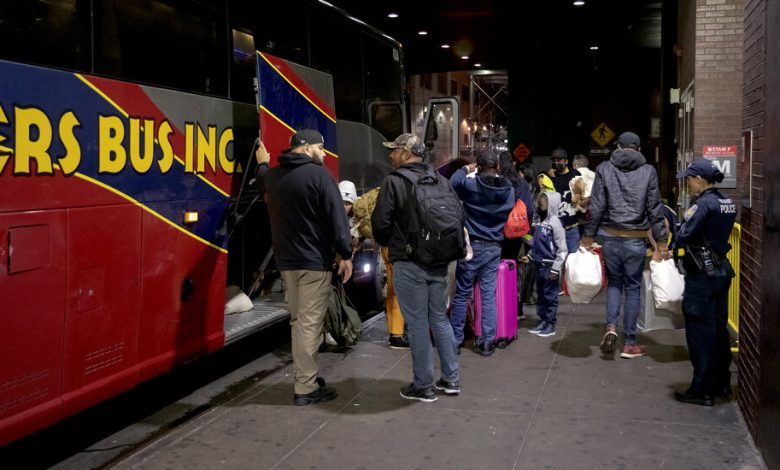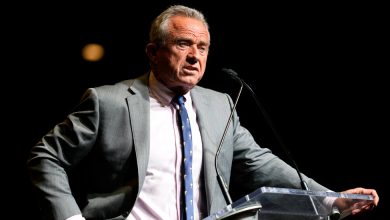Adams’s Effort to Control Migrant Buses Faces Instant Obstacles

A chartered bus from Texas filled with migrants pulled onto a street near the Port Authority Bus Terminal in Midtown Manhattan at 10:03 p.m. Thursday.
It was about 24 hours after Mayor Eric Adams had signed an emergency executive order meant to limit the arrival of such buses to several hours in the morning in a bid to slow the surge of tens of thousands of migrants the governor of Texas has sent to New York City.
More than two dozen people, including mothers with infants and toddlers in their arms, filed off the bus into a shadowy passageway outside the terminal. They grabbed their luggage from the vehicle’s cargo hold before volunteers led them to a second bus that took them to the city’s migrant intake center at the nearby Roosevelt Hotel.
The entire process took 13 minutes and showed the difficulties that New York faces as officials try to manage a crisis that they say has overwhelmed the city’s homeless shelter system. After 14 busloads of migrants arrived from Texas in a single day last week, Mr. Adams said the order was meant to bring more structure to a process he described as unmanageable.
“For many months we were able to keep the visualization of this crisis from hitting our streets,” Mr. Adams said on CNN Friday morning, “but we have reached the breaking point.”
New York City, which is required by a court order to provide shelter for those who ask, has processed 161,500 asylum seekers since spring 2022; 68,000 are now under the city’s care. From Dec. 18 to Dec. 24, 3,400 people — nearly 500 a day —went through the intake system. Mr. Adams said officials were expecting an increase in arrivals because of a new surge at the southern border.
But the plan to manage those new arrivals may be difficult to execute.
Under the order, which took effect early Friday, a bus transporting migrants must give the city 32 hours’ notice before it arrives. A manifest documenting how many of a bus’s passengers arrived in the country in the past three months, how many are likely to seek emergency shelter and how many are traveling as single adults or as part of a family, is now required.
Over the past year and a half, Texas and border cities in the state like El Paso have chartered buses to provide migrants free trips to New York as a way of relieving pressure when border crossings have increased.
The Texas governor, Greg Abbott, has said he has sent 25,000 migrants to New York City as part of an effort to draw attention to the difficulties faced by states on the southern border. Mr. Abbott, a Republican, has sent most of the migrants to cities run by Democrats in hopes of forcing President Biden to “secure the border,” Mr. Abbott’s office has said.
The buses have typically dropped their passengers off on a public street adjacent to the terminal. The order requires buses to drop off migrants there, but only between 8:30 a.m. and 12 p.m. from Monday to Friday unless given permission to do otherwise.
But many of the migrants coming to the city pay for their own tickets to come by bus or airplane, according to advocates who work with the new arrivals. Port Authority officials said the mayor’s executive order did not apply to buses with permission to drop people off inside the terminal.
Late Thursday, two men who described themselves as private contractors spoke briefly with Port Authority police officers outside the terminal after their charter bus arrived and dropped people off on the city street.
Were the men aware of the executive order?
“We are aware,” said one of them, declining to give his name and saying he had been instructed not to speak to anyone after he let passengers off the bus.
A similar order in Chicago has not slowed the flow of buses there. Charter buses have tried to drop migrants off in the middle of traffic, on random city streets and at O’Hare International Airport, according to Ronnie Reese, Mayor Brandon Johnson’s press secretary.
Bus operators have also begun to drop migrants off in neighboring towns to avoid Chicago’s new rules, according to Mr. Reese. Some towns have started to pass similar regulations to try to control how and where the buses leave their passengers.
Chicago increased its penalties this month after the flow of migrants continued. So far, the city has cited 95 buses for violating the law, has impounded two buses and has cited three buses for illegally dumping sewage.
“Texas bus operators continue to willfully break the law by disregarding regulations designed to ensure the safety of asylum seekers arriving in Chicago,” Mr. Reese said. “This inhumane treatment further endangers the safety and security of asylum seekers and adds additional strain to city departments, volunteers and mutual aid partners tasked with easing what is already a harsh transition.”
Since Mr. Adams issued the executive order, city officials say they have notified more than 50 charter bus companies that they believe are consistently used by Gov. Abbott for transporting asylum seekers about the new rules. As of Friday afternoon, the city had not received any notice of pending arrivals from Texas, said Kayla Mamelak, a spokeswoman for Mr. Adams.
Ms. Mamelak said she expected that the Police Department would begin monitoring the loading zone and issuing violations or impounding buses that violated the executive order, and several officers were at the designated drop-off zone on Friday. Migrants on buses thatviolated the order or were impounded would still be directed to the city’s intake center, Ms. Mamelak said.
Power Malu, of the group Artists Athletes Activists, has been meeting migrants at the bus terminal and connecting them to city services. He said that his group was often in contact with buses headed to the city and that he believed the executive order would force more buses to make surreptitious drop offs. Several other buses had arrived after the 10 p.m. bus on Thursday, he added.
“Instead of stepping to the side and actually supporting the organizations that are on the frontline, that have connections, that are trying to make this as smooth as possible, they want to pick a fight with Texas,” Mr. Malu said. “There’s no logic behind this.”
Despite the difficulties Chicago has faced with its rules related to the migrant buses, officials there said they had seen some progress. Permit applications from buses that included expected arrival times, the number of passengers and a manifest, had begun to arrive.
Still, the flow of migrants needing help into the city has not slowed.
“All permit applications received,” Mr. Reese said, “have been accepted.”
Andy Newman contributed reporting.




